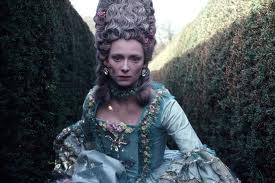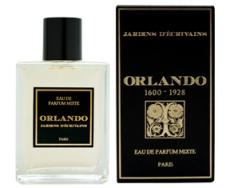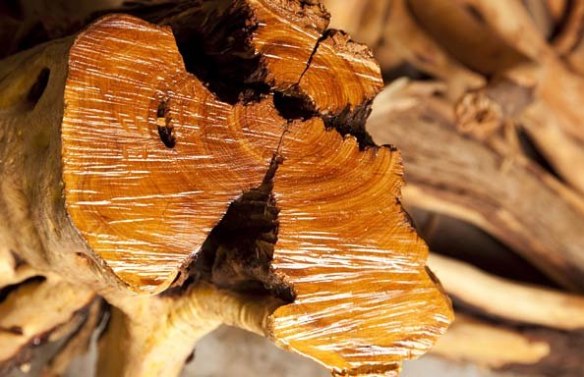
Tilda Swinton as “Orlando.” 1992, Sony pictures. Source: Cineplex.com
A young aristocrat of great beauty, born at the time of Queen Elizabeth I, becomes the elderly queen’s lover. A young man of androgynous looks who goes to sleep one day and wakes up days later as a woman. Centuries pass, she lives forever with adventures high and low, but love is a constant throughout. “Love, the poet said, is woman’s whole existence.”
Virginia Woolf wrote that line, and that story. Her novel, Orlando, is the inspiration for a perfume of the same name from Jardins d’Ecrivains, a perfume house founded by Anaïs Biguine. Ms. Biguine takes her inspiration from great literature and the beauty of gardens, whether Gigi from the French writer, Colette, George from George Sand, or Wilde from one of my favorite authors, Oscar Wilde. I can sometimes seen the literary connection which is extremely clear in cases like George, a perfume I bought for myself and which I reviewed yesterday. In the case of Orlando, it was much less apparent, but I still very much like the perfume. Orlando is a strange case for me, a perfume which actually evokes no stories or images at all for much of its existence, and one whose opening I struggled with. Yet, it always stayed in my head, perhaps because I find its middle and ending stages incredibly comfortable, soothing, and addictive.
Jardins d’Ecrivains describes Orlando, the perfume, as follows:
Jardins d’Ecrivains puts its own interpretation on the fascinating Virginia Woolf fantasy. An androgynous character with eternal youth, Lord Orlando in the Elizabethan era becomes Lady Orlando in the 18th century.
Quirky blends with the eclectic and timeless in a spellbinding fragrance. Irrational dreams, an eastern monarchy and a sense of the divine linger in its wake.
A unusual character comes through in the first notes, before the transcendent heart of the fragrance draws you in. And the warm, soft base notes convey its delicate spirit.
Top notes : Orange – Pink peppercorn – Ginger
Middle notes : Amber – Patchouly – Cloves
Base notes : Wood of Gaiac – Musk – Balsam of Peru
Orlando opens on my skin as a mix of the sharp, spicy, clean, white, fresh, smoky, and woody. There is a powerful blast of clean, white musk infused with heavy dollops of orange, clove and ginger. The pungent spices are followed by a slightly smoky guaiac wood that carries the lingering smell of leaves burning in an autumnal bonfire. The zesty, tangy bits of orange pulp are thickly dispersed throughout, as is a dark, resinous, treacly balsam resin that is lightly smoked. Moments later, the pink pepper arrives on the scene, feeling both fruited and a little bit biting. Its sharpness adds greater pungency to the cloves, but also wakes up the ginger a little. The latter is interesting because it doesn’t smell like fresh ginger but, rather, like the tamed, warm, slightly woody, powdered, bottled kind that is sitting in my pantry. Lurking far below, in Orlando’s shadows, is a patchouli note that pops up fleetingly every now and then. For the most part, it’s pretty indistinct, adding merely a dark feel to the base than smelling of actual patchouli in its own right.
It’s all lovely, except for the white musk which is something I struggle with in general. Here, it doesn’t smell of something that is purely soapy like aldehydes, though there is that touch of soapiness underlying it. Rather, it’s almost like a highly scented, potent, floral hairspray — but not completely. Whatever it is, it’s too much and, yet, for some odd reason, it almost works. Almost. If I liked musk more, I’d probably be more amazed at the freshness and natural crispness that it imparts to Orlando as a counterbalance to all those dark, heavy, spicy notes. Unfortunately, I really don’t like white musk, whatever its symbolic intentions and goal in the perfume.
There is something else, too, which I can’t explain or pinpoint. There is a floral note that has struck me every time that I’ve tested Orlando, but which doesn’t appear anywhere on the notes. It’s a subtle element that I really can’t put my finger on. It’s almost like a watery, dewy, pale rose, but not quite. A lot of the times, it feels like osmanthus with its somewhat nutty, apricot, tea-like undertones, but there is also a faintly powdery heliotrope suggestion as well. I have to say, it is driving me a little mad to try to place it. I certainly can’t explain it, except to say that it may be the indirect effect of the orange, the floral-smelling white musk, and some other note. But, I’m telling you, Orlando has a definite floral element on my skin.
Whatever the reasons or the cause, I think it adds an additional level of interest or complexity to a scent that, by and large, is quite simple on my skin. Orlando isn’t a fragrance that twists and morphs a thousand ways. What’s interesting though is that the overall impression of the perfume in the opening stage is of a very crisp, clean, dark, chewy set of contradictions. In fact, I’m starting to think that “contradictions” and paradoxes may be the Jardins d’Ecrivains signature. Still, the bottom line is that, from afar, Orlando’s opening is primarily and generally a bouquet of orange, cloves, and clean musk, infused with smoky guaiac, all over a darkly resinous base. You have to smell it up close to get the details, and it doesn’t seem to change for a while.
When it does change, however, oh, how it becomes pretty! At first, the change is very subtle and minor. By the end of the first hour, Orlando merely becomes softer, smoother and creamier with a light golden hue from the amber which has risen up to the surface. With every passing moment, however, the fragrance turns even creamier, losing that clean, fresh, white, hairspray-like crispness. The musk becomes more skin-like, sweet, and golden.
Then, at the 2.5 hour mark, the beauty sets in. Like Lord Orlando’s metamorphosis into Lady Orlando, the perfume blooms as sheer magic. It is a warm, lightly smoked, incense-y amber that is practically fluffy and sweet. It is infused with soft ginger, guaiac wood that now feels smooth and pale, and the perfect balance of cloves, alongside a light drop of orange, a subtle layer of patchouli, and a flicker of that indescribable floral note. There is a subtle waxy element lurking deep down in the depths. More importantly, though, the Peru Balsam has transformed into a creamy cinnamon-vanilla mousse. There is almost a honeyed sweetness to it, though it never feels like actual honey.
Something about the combination turns Orlando into a scent that feels related to sandalwood. The perfume has the same sort of fragrant, spicy, smoky, sweet, golden-red aroma that is actually like a creamy gingerbread caramel at times. I found it utterly addictive, and it would have felt like perfect bedtime cocoon for this insomniac to try to relax and get some sleep, except that I found myself constantly sniffing my wrists. You all know my feelings on sandalwood, and Orlando is absolutely not a Mysore sandalwood fragrance, but the combination of the notes does evoke the same overall, sensory feel. It’s light, cozy, simple, uncomplicated, but really soothing.
Orlando continues to soften, turning into a silken caress. At the end of the 4th hour, Orlando’s sillage drops and the fragrance hovers right on the skin. It’s all gold, red, ginger, spices, amber and creamy guaiac wood, with a hint of smoke and sweet musk. Midway during the 8th hour, it’s merely a glaze of spiced clove-ginger-cinnamon-vanilla with a light smokiness. In its final moments, almost 13 hours from the start, it was merely a sweetened, lightly musky woody fragrance infused with a subtle hint of spices. My skin consumes perfume voraciously, but Orlando consistently lasts between 11.5 and 13.5 hours on me, depending on the quantity applied. Three large smears from my dab vial gave me 12.75 hours, with small portions of my skin continuing to chug on well past the 13th hour. I suspect the numbers would be increased if I sprayed since aerosolization amplifies longevity.
Like all the Jardins d’Ecrivains line, Orlando is a fantastic deal for the price. It is $110 or €85 for 100 ml of eau de parfum. That comes to a mere fraction more than $1 per ml. The fragrance is also easily available throughout the U.S. and Europe, as well as on various Amazon sites from Jardins d’Ecrivains itself. (See the Details section at the end.) I don’t think Orlando is as unique, interesting or complex as George, and I really don’t like the musk of the beginning, but I’ve enjoyed it each and every time after the first 2 hours.
I’m not the only fan of Orlando. Nancy of Make Perfume, Not War is wholly obsessed with the fragrance. In a review entitled Divine Duality, she writes, in part:
The fragrance opens with some prickly spices– orange, pink pepper, and ginger, according to the official notes, which smell to me like a natural version of aldehydes minus the soapiness. Usually I cannot abide aldehydes, but here the effect makes me smile; CaFleureBon describes it perfectly as “a sense of clamorous potential”… [¶]
Orlando next morphs into a strong, dark, masculine wood with spices and resinous qualities …with precious woods (according to the notes, guaiac and peru balsam) possessing simultaneously a vintage and modern feel. There is even a touch of furniture polish to my nose, one of those odd scents I find appealing, having spent a lot of time in antique shops, auction houses, and estate sales as a child. […][¶]
Eventually, Orlando warms and sweetens without ever losing the undertones of dark wood. On me, it turns into a sweet but not too sweet, clean but not too clean, warm spicy sexy wood scent, all of the previous stages still present but melting into, yes, a twilight glow. It now skews much more feminine, which is highly appropriate given that Wolff’s character starts out male and wakes up as a woman. The drydown provides contrasts of warm and cool, light and dark, and masculine and feminine that make Wolff’s theme apparent.
The Scented Hound had a very different olfactory journey, with a minty, mentholated stage in the opening, and a subtle “sour tang” from the guaiac wood, before Orlando turned woody with some “distant” amber. He concluded that Orlando was “mysterious, conflicted, emotional” and said:
Orlando is a strange perfume for me. It’s a fragrance that seems to draw some very primal emotions from inside me. It’s beautiful and pensive and is not something that I could ever wear on a daily basis. However, it’s the perfect fragrance for those quiet fall and winter days when you just want to retreat into your own private world.
Lucas of Chemist in the Bottle had a different journey as well. In his review, he writes that Orlando began on his skin with an overwhelming amount of cloves followed by candied orange peel along with white elements. The fruit soon turned into “orange liqueur” with cloves in an aroma that was darker than the usual holiday, Christmas combination of those two notes. Then, Orlando took on
a deep and rough woody quality. Guaiac wood is a kind of dark tree and so is its smell. Powerful, intensive with balmy and resinous facets. This note somehow cuts off the earlier accords and marks the new beginning of the scent. From now on Orlando is untamed, wild and slightly unpredictable. Now is the moment when the character turns from he to she.
On his skin, the musk wasn’t clean, white or like hairspray, but “animalic, lusty and provoking[.]” The amber wasn’t significant, and the peru balsam was also different to his nose, as it “creates a feeling like you were wandering around the forest just after the rainy season. All is damp, the ground is loose and muddy.” Meanwhile, the smell of patchouli “evokes fall, with its fallen leaves, pine cones and nature preparing for a winter sleep. Moldering leaves are a quilt for the earth.” As you can see, a very different experience from both Nancy, the Hound, and myself. For Lucas, Orlando was beautiful but too complicated a scent, the “kind of perfume that I personally find difficult to wear on a daily basis. It requires more focus, more space and more attention to fully appreciate it.”
Different skin chemistry leads to different results, but it seems Nancy of Make Perfume, Not War hit the nail on the head when she talked about Orlando’s “duality.” On the one hand, there is Lucas’ dark woods and The Hound’s pensive, mysteriousness; on the other, Nancy’s “swirls of gold and red and plush textures, and contrasts of dark and light” that was much closer to my own cozy, sweet, ambered, gingerbread-sandalwood-like experience. Perhaps, Orlando the perfume represents Orlando the character better than I had thought. Either way, I think it’s an intriguing, rather different fragrance that is well-worth exploring for yourself.







